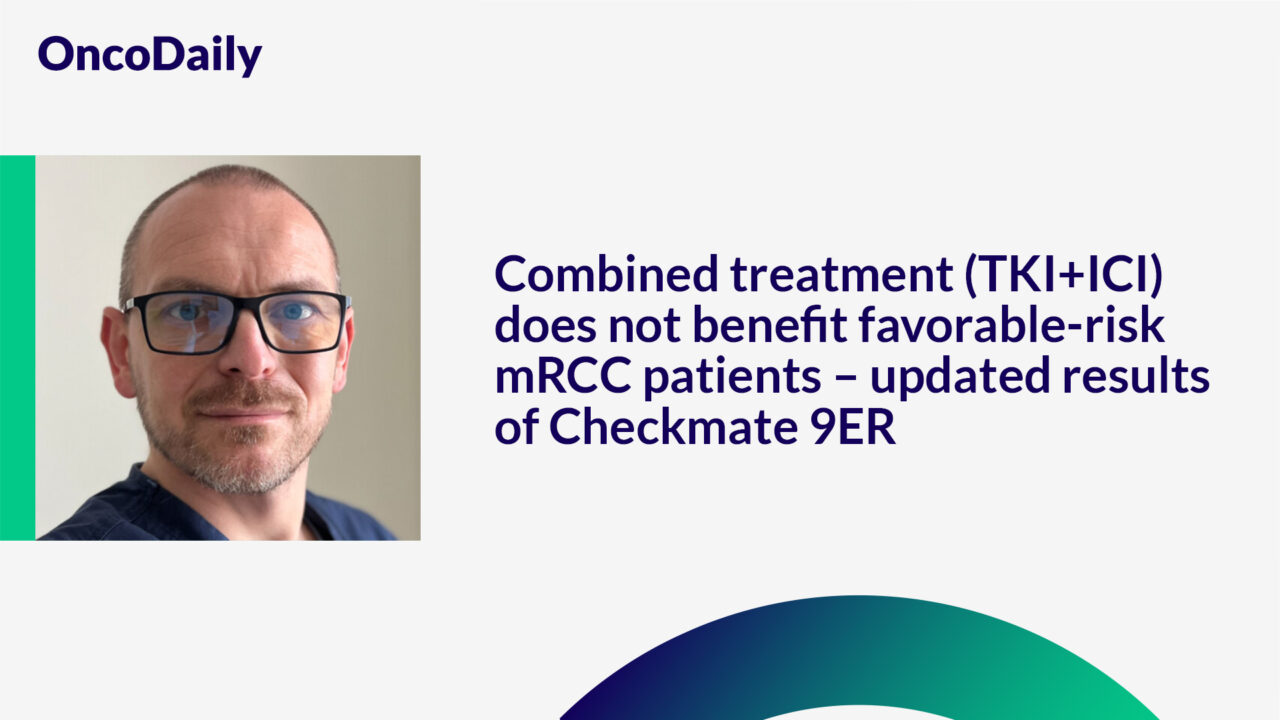
Piotr Wysocki: Combined treatment (TKI+ICI) does not benefit favorable-risk mRCC patients
Piotr Wysocki recently shared on LinkedIn:
“For several years, combined therapy based on the administration of tyrosine-kinase inhibitors and immune checkpoint inhibitors (TKI+ICI) has been recommended for all metastatic renal-cell cancer (mRCC) patients, irrespective of the IMDC risk criteria.
This recommendation was mainly based on significantly increased overall response rates and improved PFS. However, all studies provided similar results demonstrating that long-term outcomes (OS) were significantly improved by TKI+ICI therapies only in patients in intermediate- and poor-risk groups.
The update of the Checkmate 9ER study published in ESMO Open provides updated efficacy and safety data after 44.0 months of median survival follow-up. The study randomized 650 clear-cell mRCC patients to cabozantinib+nivolumab combination or to sunitinib administered until disease progression/unacceptable toxicity (maximum NIVO treatment – 2 years).
The primary endpoint was progression-free survival (PFS) per blinded independent central review (BICR). Secondary endpoints were overall survival (OS), objective response rate (ORR) per BICR, and safety and tolerability.
In the ITT population, the cabozantinib+nivolumab combination resulted in significant improvement of:
- Median PFS – 16.6 v. 8.4 months; HR= 0.59; 95%CI 0.49-0.71
- Median OS – 49.5 v.35.5 months; HR=0.70; 95% CI 0.56-0.87
- Overall response rate (ORR) – 56% v. 28%
- Complete response rate (CR) – 13% v. 5%
The benefit of cabozantinib+nivolumab combination was limited to intermediate- and poor-risk groups, whereas favorable-risk patients have not achieved significant improvement of PFS or OS compared to sunitinib:
- poor-risk/intermediate – HR for PFS 0.56 (95% 0.46-0.69), HR for OS = 0.65 (95% 0.51-0.83)
- favorable-risk – HR for PFS = 0.72 (95%CI 0.49-1.05), HR for OS = 1.07 (95%CI 0.63-1.79)
The update of the Checkmate 9ER study also confirmed higher toxicity associated with the cabozantinib+nivolumab combination compared to sunitinib monotherapy.
The only benefit of the TKI+ICI combination in favorable-risk mRCC seems to be increased rates of ORR and CR.
However, recent data from CLEAR and Keynote 426 studies demonstrated that these responses are not durable (Rini ASCO 2023, Motzer& Hutson ASCO 2023).
Transient responses, lack of significantly improved outcomes (PFS, OS), and increased toxicity do not support the routine use of TKI+ICI combinations in favorable-risk, usually asymptomatic mRCC patients.”
Authors: T. Powles, M. Burotto, B. Escudier, A.B. Apolo, M.T. Bourlon, A.Y. Shah, C. Suárez, C. Porta, C.H. Barrios
M. Richardet, H. Gurney, E.R. Kessler, Y. Tomita, J. Bedke, S. George, C. Scheffold, P. Wang, V. Fedorov, R.J. Motzer and T.K. Choueiri.
Source: Piotr Wysocki/LinkedIn
Piotr Wysocki leads the Clinical Oncology Department at University Hospital and the Faculty of Oncology at Jagiellonian University-Medical College in Krakow, Poland. As an advisor to the Polish Ministry of Health, he shapes the national cancer strategy.
His clinical expertise spans the systemic treatment of breast, gynecologic, and genitourinary cancers, with a focus on developing innovative metronomic chemotherapy-based therapies for advanced cancer patients who have undergone prior treatment.
Read other posts by Piotr Wysocki published on OncoDaily.
-
Challenging the Status Quo in Colorectal Cancer 2024
December 6-8, 2024
-
ESMO 2024 Congress
September 13-17, 2024
-
ASCO Annual Meeting
May 30 - June 4, 2024
-
Yvonne Award 2024
May 31, 2024
-
OncoThon 2024, Online
Feb. 15, 2024
-
Global Summit on War & Cancer 2023, Online
Dec. 14-16, 2023

